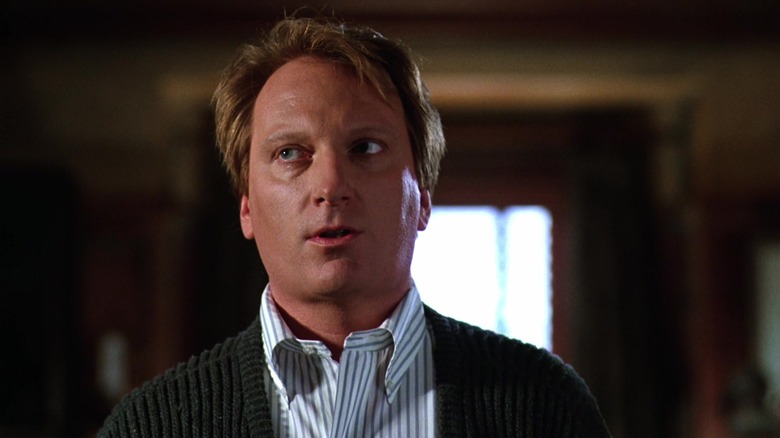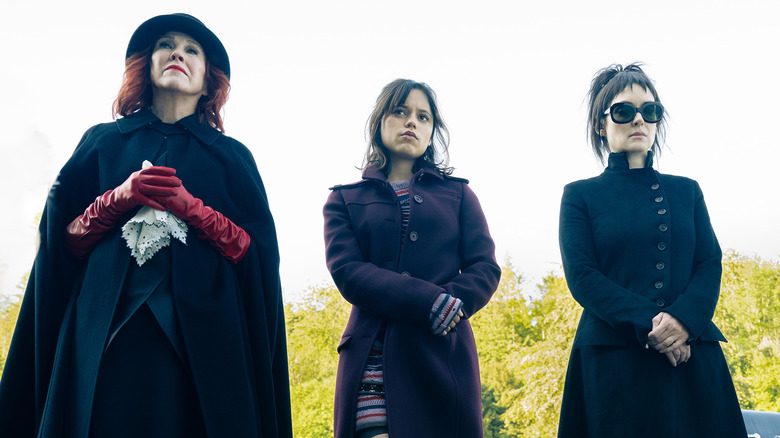Charles Deetz's Beetlejuice Beetlejuice Death Has An Unexpected Link To Tim Burton
This article contains spoilers for "Beetlejuice Beetlejuice."
Tim Burton is back to the world of the macabre and the weird in "Beetlejuice Beetlejuice," a sequel to the beloved '80s horror comedy that brings back many of the characters from the original film, while leaving behind some others. Out of every character not to return, though, there is only one who meets a rather graphic ending — Charles Deetz. Granted, there is a very good reason why Jeffrey Jones isn't back to portray Charles, and even if we could have done without showing his face via a holographic photo, the manner in which Charles dies is pure Burton.
As we learn during a spectacular stop-motion flashback, Charles died when he was on a bird-watching vacation. His plane went down in the ocean, but he luckily survived — only to get immediately eaten by a shark that bit off the upper half of his body. Turns out, there's a rather specific and personal reason why Burton chose that as Charles' death. Speaking with Entertainment Weekly, co-screenwriter Alfred Gough said that Burton came up with this death because it's "Tim's nightmare of dying."
"[Burton] literally pitched that: 'My nightmare is, I'm in a plane crash, I survive the plane crash, I almost drown, and then a shark eats me,'" Gough explained. "We were like, 'Well, that's genius. So that's going to be how he dies.'"
Now, being afraid of such a specific and gruesome death is a decidedly Burton quality, and it gets better once Charles appears in the afterlife. Throughout the film, we get glimpses of Charles with his entire upper body missing. His mangled body is quite obviously shaped like a shark's mouth, constantly spraying blood wherever he goes.
A death in the Beetlejuice Beetlejuice family
As Gough explained it, "Charles dying was the impetus for doing it," the central idea that brought the whole film together. "When you have these moments of family crisis, I think everybody likes to believe a family gets stronger. A family doesn't," he added. "Whatever fissures are in your family, in a way, get magnified. So it was just the idea of having these three generations of women under one roof in this very intense situation and how they're dealing with it and the forces that come with that."
For Burton, the long wait to make "Beetlejuice Beetlejuice" made the film more personal, motivated by his desire to revisit the character of Lydia 35 years later and explore how time has shaped her relationships with herself, her stepmom, and her kid. "It's only time can show you in your own experience in life," Burton said during a recent press event. "It's like when I made 'Big Fish,' I couldn't have made that film before my father died. I could only make that having those feelings that surprised me. So it's the same with this."
Of course, Charles is not the only character we know who gets the boot and joins the afterlife in "Beetlejuice Beetlejuice." For Burton, whose movies often deal with characters unable to grow up, a story all about confronting mortality and dealing with grief feels like a turning point — and it all started with a real fear of surviving a plane crash only to get eaten by a shark.
"Beetlejuice Beetlejuice" is now playing in theaters.

